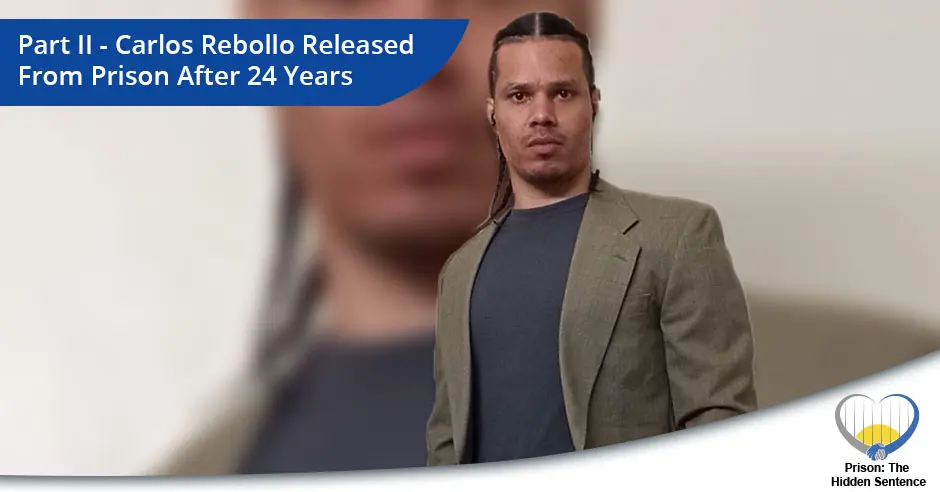
In Part I, Carlos Rebollo shared his story about what it was like being incarcerated as a 15-year-old juvenile in an adult prison. He served 24 years and was incarcerated longer than he was free. In this second part, Carlos shares his experiences-from the time he learned that he would be released to where he is today and all that he’s accomplished. When someone is released from prison after serving long sentences, they can have problems with adjusting to life on the outside. Carlos shares what he did during his incarceration to prepare for release and what his dreams are for the future. Tune in to this eye-opening conversation, where Carlos brings humanity into the incarceration experience.
—
Listen to the podcast here
Carlos Rebollo Released From Prison After 24 Years
—
I had been preparing myself for quite some time. It started when I met my mentors and asked myself, “What is the purpose of my change? What is that I’m trying to do here?” I realized that my efforts had changed from trying to gain my freedom to trying to build myself up to put myself in a position where I could take full advantage of any achievement I could gather. I went from trying to earn my freedom to making freedom significant. That’s important because it switches the eccentric around.
I’m no longer doing programming to impress the institution or look good before the parole board. I’m putting myself in a position where I’m building myself up for success. What I started to do is to look beyond the institution and all its limits. I reached out to many reentry programs, so I got involved with Ultimate Living, which provides many resources.
I wrote to the Mirror Program who also accepted me as a client and provided me a lot of resources when I was released as well. I reached out to the Campaign for the Fair Sentencing of Youth and the Incarcerated Children’s Advocacy Network, who also expressed interest in working with me. I also reached out to the talk show host and began to speak to him about my experiences and developed a personal relationship with them. I got into this groove where I was already setting my foot outside into society before I was even released.
I had so much support going outside that I felt prepared for it. On the day of my release, what I was thinking about was, “I got to get to a computer or a phone immediately and reach out to all of these resources that I have and let them know where I am so that I could be supported as much as possible.” I was very well prepared for it. It had a lot to do with the fact that I didn’t settle for what was around me or what was being offered around me. I started to reach out and established myself early on, and that helped very much.
What I would suggest is that you start speaking a lot about reentry and resources outside of the Department of Corrections. What happened in my case is that you would have inmates who had family members who were involved in reentry, and because I was always speaking about it, they would say, “My cousin, my aunt, or somebody’s friend that I know is doing this in reentry and I mentioned your name. T hey want you to contact her.”
I would read a lot of criminal justice reform newspapers like Prison Legal News or other such things that offer these services, and I will write a letter. Because Connecticut is fortunate enough to have free phone calls, I could even call anybody that I wanted to. I started looking up potential employers in salons and making phone calls to them and saying, “Would you hire me? I might be released this year and I bring this to the table.”
I reached out to an ex-police officer who now works in our federal building during reentry. She helped me build my resume and put me in contact with other potential resources. As soon as I was released, I had a resume prepared for me that I could present to employers. I continued to put myself in a position where other people knew that I was serious about what I wanted to do. The information kept coming in.
I didn’t want to get caught up in this mentality that was surrounding me at that time when I was trying to change. I remember having a conversation with someone and they were on their way out. They told me, “I have to get a job and get employment. I have to get housing because I don’t want to go back to prison.” I trained myself to read between the lines and go directly to the premises, so I thought, “This guy is being incentivized by avoiding prison, but he thinks that the only reason to be successful, productive, responsible and independent in life so that he doesn’t commit a crime anymore. That’s false. It’s not true at all.”
I think about your typical citizens in society. They don’t wake up every day, invest in the future, get an education or provide for their children because they’re afraid they might do the very worst thing that will bring them to prison. I was like, “Why should that be true with being incarcerated on population?” I started to tell myself like, “No, I’m not doing this just to avoid the very worst of me. I’m doing this to give life and expression to the very best.” In that way, I can appreciate what it’s like to challenge myself, overcome obstacles, set goals, accomplish them, and so on and so forth.
I'm not doing this just to avoid the very worst of me. I'm doing this to give life and expression to the very best. Share on XI had to rid of that idea early on. It led me to say, “I’m not doing this for freedom. I’m doing this to make freedom significant.” The reality is, and I tell a lot of all the inmates, that freedom, in and of itself, is not something great. You have a suicide rate that’s twice a murderer. I tell them, “For every one person that’s saying, ‘Please don’t shoot, I want to live,’ you have two people who are saying, ‘I don’t want anything to do with freedom anymore. My mental health is declined. I have no support. I don’t feel competent and I don’t want to live anymore.'”
To think that we can be thrown out into society by doing programs, putting on this great show, being released afterward and thinking, “I got my freedom and I’m great now.” It’s not reality at all, so I had to get rid of that mentality about being incentivized in order to avoid the very worst people, and I got rid of it.
As a result of all of the work that I was doing, Breakthrough Films contacted me on behalf of HBO to do a documentary on my life. They were filming me while I was in prison. I immediately contacted them on my day of release, and I let them know the transitional house that I was going to be placed in. When I got into the van, there was no specific feeling or thought that I could pinpoint to, but I was taking it all in stride.
When I was placed inside the van, I got so sick. I was dizzy. I had motion sickness because I hadn’t been in a van for over fifteen years. I hadn’t taken a trip anywhere because, in prison I was in, I was there for nineteen years, from 2005 all the way to my release in 2022. I kept asking the officer to stop the van so that I could throw up because it was so bad. I couldn’t stare at anything. When we finally got into Bridgeport, where I was born and raised, there were certain signs I couldn’t even look at. I can’t say why but I had to put my head down because it was too much.
When I finally got out of the van, I had these cameras rushing from the film crew and they were asking me, “How does it feel to be out?” I’m like, “I want to throw up. That’s what I want to do. I’m sick to my stomach.” It’s not quite the typical story that you may hear from men who are gaining their freedom after so many decades.
There are 52 people in three houses. It’s called the small house, the big house and the main one. I’m in the main one in dorm three and I’m in there with seven men. The room is relatively large and they provide resources. They take off the financial burden that you may go through by providing a house for you where you can stay and come through.
It has its restrictions, so you need to make your schedule every single week so that they can know where you’re going to be. You have to make out passes whenever you leave, stating the time, the place, the phone number and your expected return time. This is every time you leave. It’s helped a lot. It has its difficulties because you have men who are trying to integrate into society. Some things are last minute. Some of them have drug problems and mental health issues. All of that plays out in here.
For the most part, I felt safe and encouraged. I’m being supported in many of my efforts and partake in the work that I want to do with criminal justice reform. There is a program that I’m involved in called Hang Time. It was created by an ex-police officer and now Federal Agent, Charles Grady. He’s bringing me everywhere with him. We spoke to 35 prosecutors at the Chief State’s Attorney’s office.
I gave them my story because I wanted them to put a face to their files and understand that when they’re charging someone, it’s not just the crime that should matter. There is a history there that should be accounted for and considered when being in our sentences. They were deeply affected by that. I also, as a result of that program, went to Capital Prep to speak to high school students.
It's not just the crime that should matter. There is a history there that should be accounted for and considered when being in our sentences. Share on XThat resulted in an invitation from P Diddy to The Hang Time program. I’m looking forward to going to New York. We recently also went to Walton to the Peabody Museum to celebrate our program and speak about our mission. We have a great time. Joining the Hang Time team has helped me get into the spaces and create a platform, so I’m excited about that.
I’m networking my life away. I’m trying to reach out to as many people as I can. I have a sit down with someone from the ACLU who is considering making me part of a project called The Smart Justice Project, where they hire ex-offenders into the program to advocate for Criminal Justice Reform. I’m also working with House Representative Josh Elliot. I was already involved with him because I emailed him while I was in prison over the free phone call bill that he was proposing and got to pass.
I’m also working with a campaign called Worth Rises out of New York. They were also collaborating with the free phone call bill. I’m just trying to get involved with many organizations that have to do Criminal Justice Reform in order so they can understand my story, where I came from, what challenges I faced and the changes that need to be implemented so that my story is not in any way unique.
Yes. While I was in prison, I enrolled in the Yale University program. It is called the YPI, Yale Prison Education Initiative, and they have begun to implement higher learning courses. They were so great at what they did that the Mellon Foundation donated $1.5 million to them. As a result of that, the University of New Haven joined them in their mission to provide higher education to us and offered us a degree in General Studies.
When I was released, I immediately enrolled in the University of New Haven. I switched my major from General Studies to a Bachelor’s in Multiplatform Journalism and received a full scholarship as a fully enrolled student. It’s been great. My professors are excited to have me. The students have been very supportive, and the environment and the culture are amazing. I start school in the Spring semester of 2023. I’m looking forward to it.
The Hang Time program is going to be paying for my train trips. I take the train to West Haven and back. That’s very costly, so they offer to pay the expenses for me because they’re excited about me going home, but I walk everywhere other than that because that van trip on my release day did a number on me. Every time I get in the car, I get super dizzy and sick, so I walk everywhere in the rain and snow. It doesn’t matter. I love walking.
I didn’t expect this, but colors are very disoriented. If I walk into a mall, there are all these different colors. It’s hard for me to focus on anything else. I see greens, reds, purples, and oranges. I’m used to seeing whites, blacks and grays. That’s very disoriented, and to this day, whenever I go out and see these, it’s very disoriented for me.
Yes, it’s a lunch call but they save us all our plates if we don’t make it on time.
I think it’s great in terms of pacing yourself. I know that I have tons of support but if I didn’t have this group over my head, I didn’t have the structure that is in this transitional house. I can’t even begin to fathom the burden that I would have of me. Able to go upstairs and have the space where I know I can come in, go to sleep, wake up, do whatever I have to do, plan my schedule ahead of time, and then be at certain appointments at certain times while being supported by my case worker and the staff.
Also, receiving direction in terms of what programs provide what resources, what programs get me into employment opportunities more than others and so on and so forth. In terms of pacing, transitional housing is a need that serves a purpose in terms of welcoming men coming home from prison and women as well.
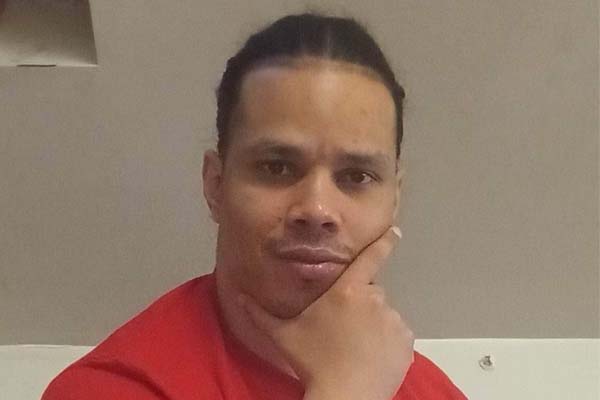
My son works. He has this hectic schedule, so I barely see him, but we do communicate through the phone. I was fortunate enough because we set a date to film together. On that day, they picked me up and I went to a basketball court because my son always wanted to play basketball with me. His love of basketball had to do with the stories that his mother had told him about me when I was young. She even saved a lot of my clothing and gave it to him as he grew up. One of those was a basketball jersey that he wears a lot.
When HBO picked me up, I was across the street and I saw him practicing playing basketball. The producer saw my reaction and said, “Get in the car because you’re getting very emotional. We want to capture all that.” When we finally met up, I said, “Do you want to talk first or do you want to play basketball?” He said, “Dad, I’ve been waiting for this game for many years. We’re going to play basketball first.” We played basketball, and afterward, we sat down, spoke, cried, shared, and ate together. We said our goodbyes, but I’m so happy that it was captured on film because now we have a memory that lasts a lifetime, and that means the world to me.
My younger brother passed away and left three kids. When I tried to reach out to them, it turned out that he had other kids from different mothers. When I tried to reach out to another brother, my nephews and nieces turned out that he had kids from many different women as well. It’s been very difficult trying to involve myself in their lives. It’s gotten to the point now where it seems so difficult to maintain these relationships. I had to make a choice to reach out whenever I could. I try to do the best that I can while moving forward and not getting stuck here. It’s difficult going into this and there is no structure at all. I’ve seen my mother. She came to visit. I’ve seen my aunt and some cousins and they’re all happy.
Immediately, what they told me was, “Carlos, the first thing you have to understand about living a productive and positive life is that it’s not okay to sacrifice anybody to yourself or sacrifice yourself to anybody. In any relationship, which you always have to think about is what you have to bring value.” What your responsibility in life is to find others who have something of value to offer you. In return, you offer them their values and you build personal relationships and productive relationships but you never violate the rights of others in order to gain what you want. You never manipulate people. You never deceive them and you have to be able to understand that all of this is wrong. Not because it hurts others but because of the sense of this mentality within your mind that completely defies what actual reality is.
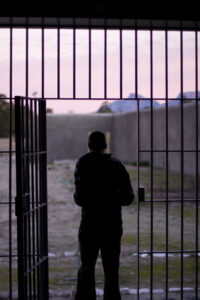
What I mean by that is for me to do anything in life, I have to develop the knowledge that is required for me to understand what I need to do to get to where I need to go. I need to be able to read, go to school and engage in critical thinking, but basically, they said, “You’re at the center of this and you only get one life. The way you treat and think about yourself is what is of primary importance. You have to make yourself as effective as possible so that you don’t need to do anything at all that would jeopardize yourself.”
It was an example of honesty and integrity of decency that I never had in my life. As friends, it was difficult sometimes for me because I was always around them. It always presented the challenge of, “You have to be better,” and I didn’t want to deal with that every single day. I broke up friendships many times, but given the values that I had developed, it was almost impossible for me to not gravitate toward them again so we would always reconcile our friendship. They went on and he was released after 26 years. He’s now about to be a producer on a regular talk show. They love him there.
Our mission now is to get my other mentor out of prison because I want everyone to see all of the accomplishments that I’m making or that I’m having and all of the work that I’m doing and tell them, “If you believe in me, if you can be certain of the person that I am, then you have to know that the person that’s been a castaway is largely responsible for the person that I am.”
I think that he deserves consideration in terms of being released early. These men, I love them. They’ve been a figure for me like I’ve never had, especially when everything else failed you. They provided me with a philosophy of life that consisted of primary honesty and integrity, being true to my values and making sure that my values are appropriate to life and that I stick to them.
One of the things that I found amazing is that they always told me, “If you know something to be true, then numbers don’t determine reality. It only takes one person to identify whether something is good or not, and it’s your responsibility to hold onto it.” I would be in the spaces where everybody would be against and tell me, “No, you can’t live like that. You can’t possibly that honest, responsible and independent,” because it’s not sustainable.
If you know something to be true, then numbers don't determine reality. It only takes one person to identify whether something is good or not, and it's your responsibility to hold onto it. Share on XNot in the world we live in. Watch me work and I turned out to be right. Those very people who doubted me would be the ones that would seek my counsel and support whenever they would go through difficult times, which was an affirmation to me that I was on the right path. Kudos to them. They did an excellent job.
Thank you for the opportunity to give that last word to me. I realized that, in my mission to be better, I ended up the way I ended up because I gave up on the very best in me. I didn’t even have to take account of my flaws at all because I knew that by giving up on the part that I loved about me the most, everything else followed. My advice to families is if you have children who are struggling, loved ones or any kind, it’s not so important to focus on their flaws or on their vices.
Find what’s very great about them and challenge them and find a way to support the very best parts of them so that they can wake up every day and try to give life to those parts rather than focusing on what they need to change about themselves. If you focus on your virtues, eventually, the flaws will die away. If you every single day wake up trying to fix what’s wrong with you, it sets up the cycle where you’re constantly reminded how inadequate you are, and that’s a recipe for disaster.
Yes. If somebody had told me, “You’re an excellent and honorable student.” A part of me that thrives in educational settings, so let’s keep you there. Let’s find a way that we can surround you with a cultural system that is geared towards developing those qualities in you rather than criminalizing me or putting me in environments that contradict those qualities.
I always said, “Prison to me wasn’t a punishment. It was too close to the life that I was living before I entered prison. What became a punishment was when I started being responsible with the better parts of me,” because then the challenge was I can be better. What do I need now to give life to those qualities?
It allowed me to understand and appreciate my humanity in a way that weighed and broke me to the point where I was like, “I almost took an innocent life.” There has to be a distinction there. If you want to treat me like a beast, I’m not going to be able to appreciate what it’s like to be on the other side of humanity because there are no differences there.
The first thing that we have to understand with rehabilitation is that there has to be a difference and it has to be a humane one. That’s the only way you can get men and women who have committed crimes that are heinous to come to and find understanding of their own humanity so that they can understand those and others as well.
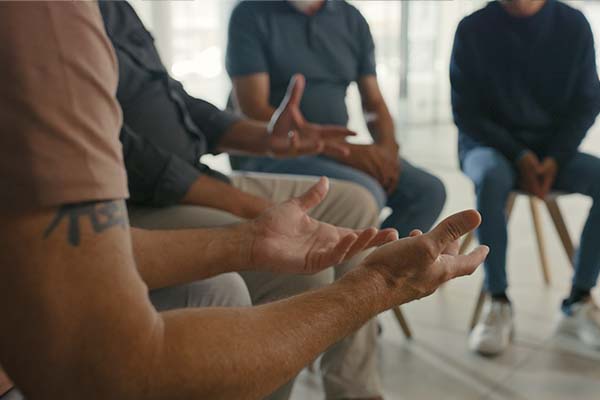
Thank you so much.
—
Important Links
- Carlos Rebollo – LinkedIn
- Campaign for the Fair Sentencing of Youth
- Incarcerated Children’s Advocacy Network
- Hang Time
- Worth Rises
- Yale Prison Education Initiative
- Mellon Foundation
- Contact@PrisonTheHiddenSentence.com
- https://www.Audacy.com/wtic/blogs/todd-feinburg/todd-feinburg-introducing-carlos-rebollo
- https://MinutesBeforeSix.com/wp/your-painting/
- https://www.Bridgeportct.gov/MIRA
- https://CFSY.org/what-we-do/ican-stories/
- https://PrisonFamiliesAlliance.org
- https://PrisonTheHiddenSentence.com
About Carlos Rebollo
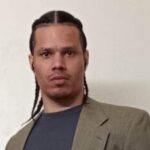 My name is Carlos Rebollo. I was sentenced to 45 years in prison at the age of 15. I was recently released on October 31, 2022 after serving 24 years in prison. During my incarceration, I was able to achieve an Associate’s degree in psychology, and become a student of Yale Prison Education Initiative, The Second Chance Educational Alliance, and the University of New Haven. Today I am enrolled as a full-time student at the University of New Haven pursuing a bachelor’s degree in multiple platform journalism. I am also a member of the Campaign for the Fair Sentencing of Youth and of the incarcerated children’s advocacy Network. Our mission is to stop the injustice of sentencing children to excessive and life sentences.
My name is Carlos Rebollo. I was sentenced to 45 years in prison at the age of 15. I was recently released on October 31, 2022 after serving 24 years in prison. During my incarceration, I was able to achieve an Associate’s degree in psychology, and become a student of Yale Prison Education Initiative, The Second Chance Educational Alliance, and the University of New Haven. Today I am enrolled as a full-time student at the University of New Haven pursuing a bachelor’s degree in multiple platform journalism. I am also a member of the Campaign for the Fair Sentencing of Youth and of the incarcerated children’s advocacy Network. Our mission is to stop the injustice of sentencing children to excessive and life sentences.
Love the show? Subscribe, rate, review, and share!
Join the Prison: The Hidden Sentence Community today:

Leave a Reply